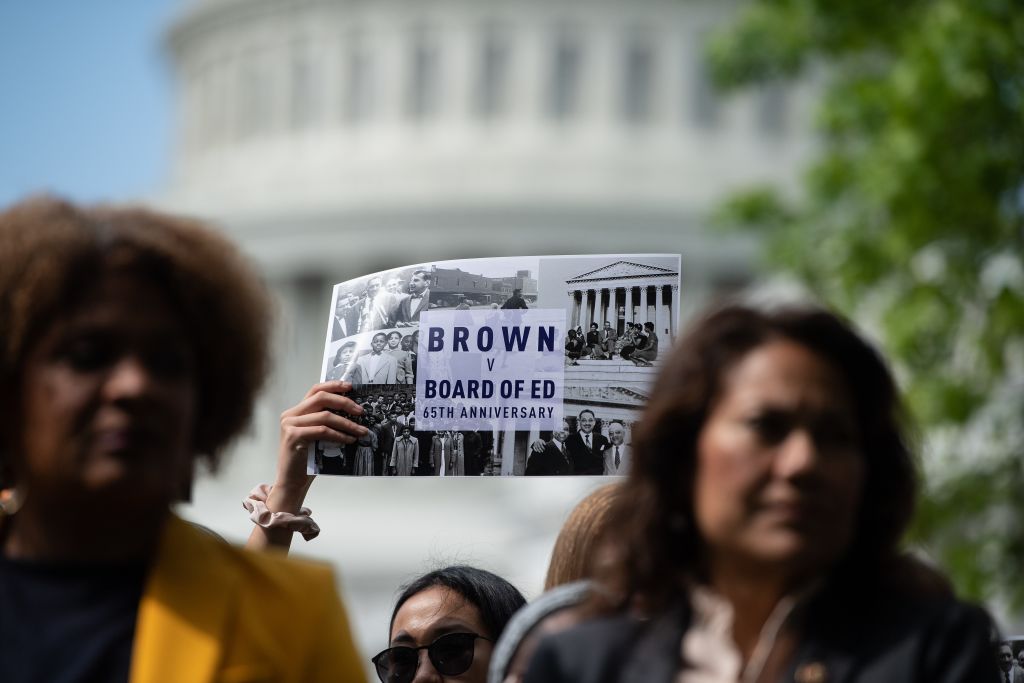Conservatives Leave Out Key Facts From Claim That Democrats Didn’t Support Black Woman Judge Nominated By Trump
Source: NICHOLAS KAMM / Getty
Conservatives are trying to make anything stick to distract from the upcoming nomination of the nation’s first Black woman Supreme Court justice, bouncing from one talking point to the next. Some have pointed to 13 Democrats voting “no” on the confirmation of a Black woman Trump nominee for a federal judgeship in 2019.
But as per usual, there is more to the story than Democrats blocking a Black woman nominated by Trump. The senators who voted against confirming Judge Ada Brown were not simply objecting to a Black woman judge but responding to calls from civil rights organizations to block any nominee who declined to “state unequivocally” that Brown v. Board of Education was decided correctly.
In an open letter to members of the Senate, The Leadership Conference on Civil and Human Rights asked the officials not to confirm 27 Trump nominees if they failed to affirm the value of Brown.
The letter read in part:
All nominees who have refused to state unequivocally that Brown was correctly decided should be given an opportunity to clarify their testimony. And those nominees who cannot bring themselves to affirm a case as vital to the fabric of our democracy and legal order as Brown do not deserve a lifetime appointment as a federal judge. Below is a list of pending judicial nominees who as of the time of this letter have declined to state that Brown v. Board was correctly decided. We urge all senators to uphold the importance of this fundamental civil rights ruling by voting against these nominees unless they clarify their testimony and state unequivocally that Brown was correctly decided. There must be a moral floor for these lifetime appointments to our federal judiciary.
Assistant Attorney General Vanita Gupta signed the letter in her prior capacity as president and CEO of The Leadership Conference on Civil and Human Rights. The request came during the landmark decision’s 65th anniversary week.
At the time, the National Education Association (NEA) also called senators to oppose nominees who declined to endorse Brown. In explaining its stance, the NEA cited an op-ed by Sherrilyn Ifill, president and director-counsel of the NAACP Legal Defense and Educational Fund.
Ifill called the refusal of nominees to affirm Brown “downright dangerous.”
Confirmed by a vote of 80-13, Brown refused to answer directly about Brown. While Brown acknowledged the importance of Brown in her own ability to attend “an excellent integrated school,” she declined to say whether the Court correctly decided the case definitively.
An article by Bloomberg Law commemorating the 65th anniversary of the landmark case said that nominees could have been trying to avoid a conversation about Roe v. Wade. The article also noted that several nominees invoked Cannon 3A(6), which says judges should not publicly comment on pending cases.
During her testimony, Brown used Cannon 3A(6) to avoid giving a direct answer on the correctness of the Brown decision. But experts say the rule doesn’t apply as there wasn’t a valid challenge to Brown pending in any court.
By comparison, Black women federal judges nominated by Biden last year were confirmed by a much slimmer margin. Judge Ketanji Brown Jackson was confirmed last June by a vote of 53-44. Similarly, Judge Candace Jackson-Akiwumi was confirmed by a vote of 53-40.
SEE ALSO:
Beyond Black: Racial Justice Groups List Qualities Biden’s SCOTUS Nominee Must Possess
[ione_media_gallery id=”4277202″ overlay=”true”]

